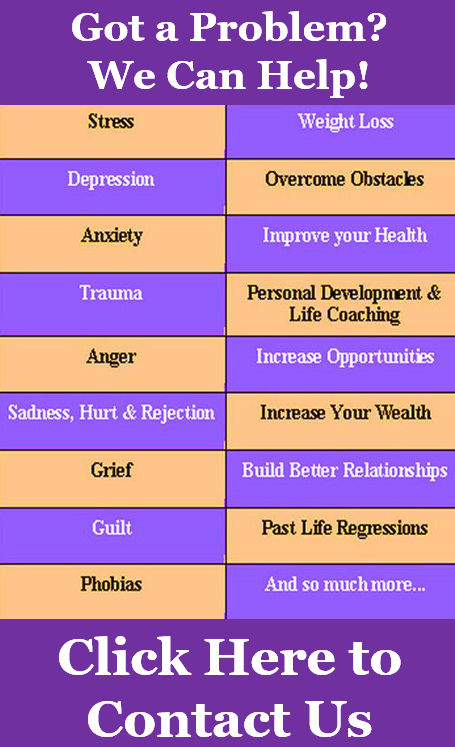The Prime Directives of Your Unconscious Mind
The Prime Directives of the unconscious mind provide a framework for the context of doing, Hypnosis, NLP, Time Line Therapy™ or coaching with yourself or others. The model of the Prime Directives gives us some powerful assumptions which structure our use of the tool and of the techniques available for us to use. The term Prime Directives means that the unconscious mind is “hard wired” (meaning that it comes from the factory this way) and is set-up to provide or to do the following:
1.TO STORE OUR MEMORIES: The unconscious mind provides the coordination for the storage of memories. Research as far back as 1957 (the Penfield Study) indicates that everything that happens is recorded faithfully and stored as memory. You may remember that in 1957, they probed a woman’s brain with an electrode, and she remembered everything that happened during a birthday party when she was a very young child. She remembered the feel of the fabric of her dress, the taste and smell of her birthday cake, how her mother and her friends looked, etc.., as if she were actually there. As a result of that study, neuro-physicists postulated in 1957 that everything that happens to us is stored in the brain in full detail. In 1960, Carl Pribram won the Nobel Prize for his theory that expanded the place of storage of memories from the brain to every cell in the entire body, when he postulated that memories were stored holographically in the nervous system. It is the unconscious mind that is responsible for the coordination of the storage of and for access to these memories.
2.ORGANIZES ALL OUR MEMORIES: The unconscious mind organizes all the memories which are stored in the nervous system . The way it organizes these memories is that it uses “indexes” to point to the stored memories and to allow you to access these memories. Your Time Line is one such index, the organization of your values is another such index that the unconscious mind uses.
3. THE DOMAIN OF THE EMOTIONS: The unconscious mind is the domain of the emotions. Even though they are often felt consciously, emotions are not the domain of the conscious mind. They are generated by, maintained by, and are the responsibility of the unconscious mind.
4.REPRESSES MEMORIES WITH UNRESOLVED NEGATIVE EMOTIONS: Now, here is where some interesting paradoxical situations can begin to occur. The unconscious mind is also charged with the responsibility of repressing memories with unresolved negative emotion. The emphasis here is on “unresolved.” The memory will be repressed with the emotion intact until it can be resolved. The unresolved negative emotion can cause some repression of the content of the memory to the extent of the intensity of the emotion, and to the unresolvedness. (These repressed memories are visible in the Time Line as dark or missing areas.) The repressed negative emotions are trapped in the body, and in many cases can cause blockages to the flow of communication through the neural network pathways of the body.
5. PRESENT REPRESSED MEMORIES TO RELEASE THE EMOTIONS: Memories which have been repressed are then presented to release the trapped negative emotions. This is the next function which the unconscious mind is “supposed” to perform, and it is a function which can be a long term function. Supposed is in quotes because in a number of cases, and with disfavor from the conscious mind, the unconscious mind will stop presenting the memories for release and keep them repressed. If the conscious mind can, at the time of presentation of the memory, release the emotions by “rationalizing” (making rational, preserving the learnings) the memory can be cleared of the negative emotions.
6. KEEP REPRESSED EMOTIONS REPRESSED FOR PROTECTION: The Unconscious Mind also has the option of keeping the memories repressed. In some cases this is what the unconscious mind does. This is a short term function, however, and in the long run the unconscious mind will continue to attempt to present the memories so that they can be released, because repressed emotions are just not good for the body. (See Prime Directive number 8.)
7. TO RUN THE BODY: The unconscious mind has also been called the “body-mind” or the mind of the body, and in performing this function, it provides the consciousness, and the direction for the functioning of the body.
8.TO PRESERVE THE BODY: The unconscious mind is also in charge of preserving the body. This means, other things being equal, that if you walk out to the street and step in front of a bus, your unconscious mind will endeavour to alert you to the impending danger so that you jump back out of the way, and remain safesafe. In times of extreme danger, many people notice that the unconscious mind takes over, and the conscious mind is not at all involved at that moment.
9.TO BE A HIGHLY MORAL BEING: This is not necessarily a Prime Directive as much as it is an instinct that is built in. The unconscious mind will enforce any morality which it has been taught and has come to believe is true. This Prime Directive is included, however, because it is so important in healing. If the Unconscious Mind thinks that you have been bad, then of course, you will have to be punished. In healing, then it is important to know if the unconscious mind feels as though it needs to punish you. The question might arise, “What kind of morality are we talking about?” We are talking about any kind of morality which the Unconscious Mind has been taught and which it believes.
10. TO TAKE DIRECTION, FOLLOW ORDERS: The unconscious mind likes to have direction from the conscious mind and it likes to be in rapport with the conscious mind. If there is no rapport, the unconscious mind will not follow the orders or directions from the conscious mind. With rapport, the unconscious mind will follow just about any direction from the conscious mind. Trust is important to develop in this context, because the unconscious mind is in charge of our physical and many of our mental processes and therefore rapport between the conscious and unconscious mind is a must.
11.TO CONTROL AND MAINTAIN ALL PERCEPTIONS: As our sensory perceptions come in to the neurology from outside the body, they must pass through the unconscious mind before they become available as conscious perceptions. The unconscious mind is in charge of filtering the massive amount of data that comes in, and making it manageable for understanding by the conscious mind. You may have heard that one estimate is that we have approximately 11,000,000 bits of information coming in through all our sensory input channels. The unconscious mind filters these down to manageable chunks of information. But of course not all the information that we have coming at us can be processed consciously so much of it is processed through our senses.
12. TO GENERATE, STORE, DISTRIBUTE AND TRANSMIT ENERGY: As the “manager” of the body, the unconscious mind also is in charge of the energy of the body. Most of the energy in the body is generated by the interaction of glucose with oxygen. Since the unconscious mind is in charge of the energy, it can be asked to increase the energy in the body for various purposes including weight loss and healing.
13.TO RESPOND WITH INSTINCT AND HABIT: Some instincts are built-in at birth such as the Fight or Flight response. Habits are cultivated over time. The unconscious mind is responsible for generating and maintaining both instincts and habits over time.
14. NEEDS REPETITION BUILDING HABITS: When cultivating a habit it is a good idea to repeat it often until it is taken-over by the unconscious mind. The unconscious mind is really in an on-going “now” most of the time, and so needs a fair amount of repetition to build a habit.
15. TO CONTINUALLY SEEK MORE AND MORE: The unconscious mind is directed to continually seek more and more. So the new car you just had to have, and you finally bought seemed like “just any old car” after a short period of time (say, three weeks), and perhaps you were prompted to wonder, “what’s next?” Unfortunately many people also have this attitude to relationships and wonder why they can’t maintain a healthy and stable relationship over an extended period of time.
16. WILL HAVE OPTIMUM FUNCTIONING WITH A MINIMUM OF PARTS: The unconscious mind will function perfectly with a minimum of parts. In fact, the fewer parts the better. Since more parts means more possibility of inner conflict, and since each part cannot be expected to have the intention of the whole as its highest intention, the fewer parts the better. The most perfect functioning occurs as a whole integrated functioning unity.
17. IS SYMBOLIC: The unconscious mind is symbolic. It is in many areas, pre- literate, so it creates and uses, and responds to symbols (thank you Carl Jung for first pointing this out to us). Much of what the unconscious mind gives us is symbolic. This does not mean that it is meaningless, quite the contrary, the symbols can be interpreted, and will have significant meaning. We need to learn to interpret our dreams and the signs around us that become part of our focus because these are messages from our unconscious mind.
18. WORKS ON THE PRINCIPLE OF LEAST EFFORT: The unconscious mind works on the principle of least effort, and that means it will do as little as it can get away with. This principle serves the unconscious mind well in energy conservation, but not necessarily in healing various symptoms. For example, if you are asking the unconscious mind to clear up certain symptoms, you must ask the unconscious mind when it will start and when it will finish the process, or you may find six months later the process is incomplete. When asked, “why?” The unconscious mind may simply say, “I haven’t started yet.”
19. TAKES EVERYTHING PERSONALLY: Remember that old saying when you were a kid, “One finger’s pointing out away from you, but three are pointing back at you?” That is because the unconscious mind takes everything personally. The good news is that what you like about your friend, is you. The bad news is that what you dislike about your friend, is also you. The saying in psychology is, “Perception is projection.” What you see is who you are. So think the best about everybody you meet. If you are practicing as a therapist, educator, or manager, especially, think the best about your clients or students – think that they are magnificent, and that they can and will change using Hypnosis, Coaching, NLP, Time Line Therapy™, (or any other therapy) and they will. Based on the work of George Estabrooks (1943) and Andre Weitzenhoffer (1957), that what the therapist (or educator, or manager) does not believe to be true will not be actualized by the client. If you believe that they can do anything, then they will. If you see your clients as magnificent they will be magnificent. The more good you see in your clients the more they will actualize that good for you, and for themselves. The more you do that, the more your own unconscious mind will feel good about you, and prosper. Honor and respect the unconscious mind. If you can, love the unconscious mind. You and your unconscious mind are going to be together for a long, long time, so you might as well get along well. If you can remember your magnificence you will be magnificent!
20. CANNOT PROCESS A NEGATIVE: Finally, and we have already discussed this earlier, make sure you are telling your unconscious mind what to do, think, be; as opposed to telling it what not to do, think, be. Enough said.. Your Time Line is how your unconscious mind encodes and stores your memories. It’s how you know the difference between a past memory, and a future dream? Your Time Line is largely an unconscious process, and like remembering your home phone number, you may be more or less aware of it from time to time.



Comments are closed.